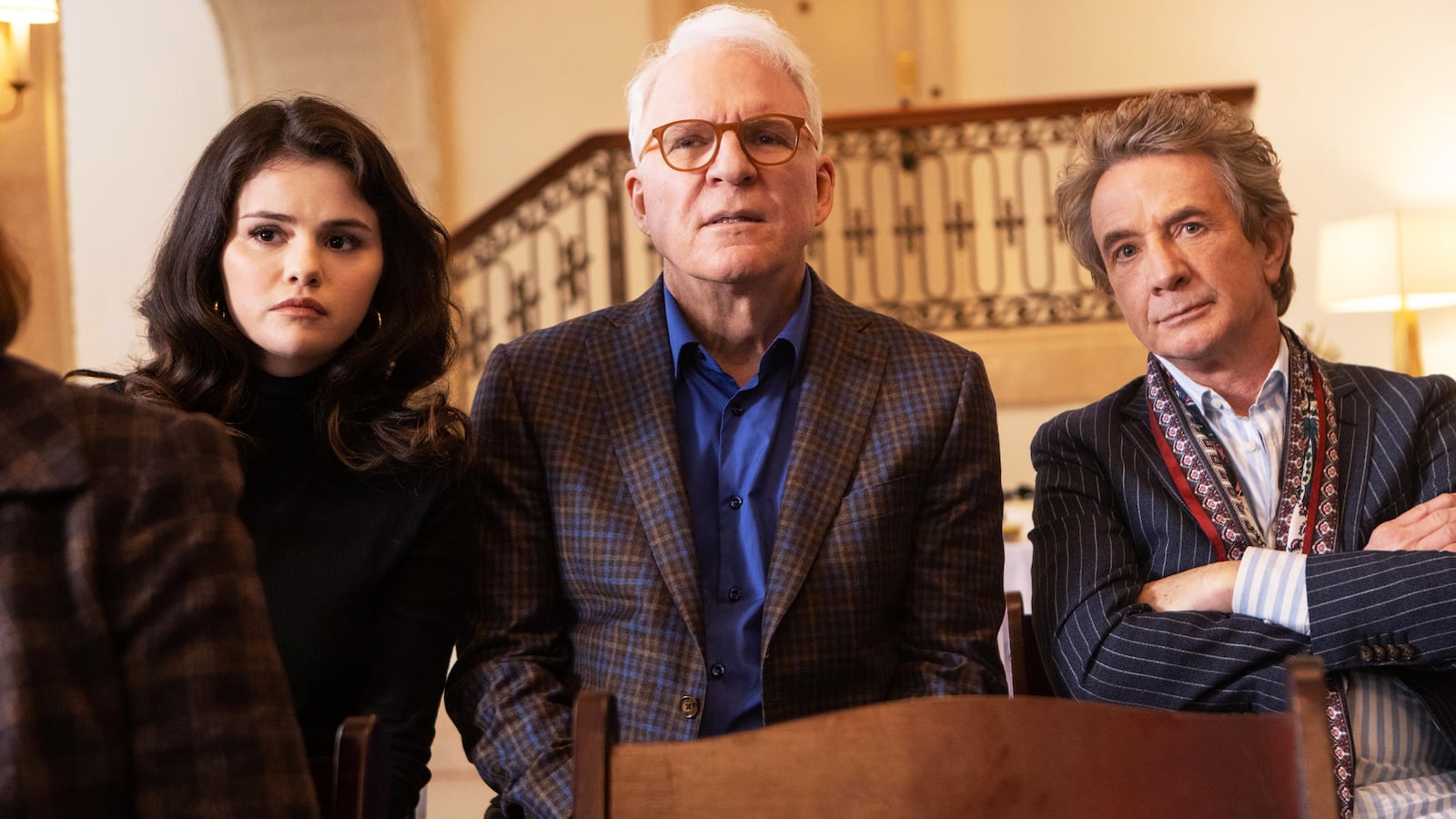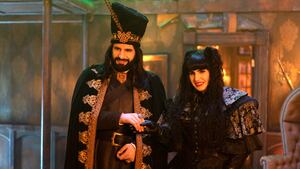This is a preview of our pop culture newsletter The Daily Beast’s Obsessed, written by senior entertainment reporter Kevin Fallon. To receive the full newsletter in your inbox each week, sign up for it here.
On the morning after record rainfall in New York City and so much alarming flooding that it made me question if I should ever leave my apartment again, I swam my way over to my computer and contemplated why I felt so deeply seen by the new TV series Only Murders in the Building, which came out this week on Hulu.
It stars septuagenarian comedy legends Steve Martin and Martin Short (can’t relate), who live in breathtaking, spacious apartments in a tony building on the Upper West Side (lol still can’t relate) and befriend Selena Gomez (nope!) because of their shared obsession with true crime podcasts (absolutely not).
Especially after this week’s precipitation trauma, nobody needs someone to rain on their parade, so I’ll withhold my abhorrence of true crime podcasts. I’ll also silence my near-incredulity that a series could center a group of people so passionate about them that they venture to make their own, and somehow not be entirely insufferable.
But of course, it’s not insufferable. It’s Martin and Short in a quirky comedy that asks, “What if The New Yorker was a television series’ entire aesthetic?” Anything, even true crime podcasts, is going to be fun.
So, I set out on the Only Murders in the Building journey—three episodes are now available—with the idea of the show as a glorious, necessary pleasure right now. That, along with Ted Lasso, The Other Two, and the new season of What We Do in the Shadows, it would be an example of how, even after all this time in the pandemic, our demand for delightfulness in the face of darkness is as strong as it was all those months ago. That I would like the show because it is simply nice. Remember nice?
I didn’t expect, after pressing play on episode after episode (I’ve gotten to see the whole series), that I would end up finding it to be so deep.
The fast sell on the series is that Martin, Short, and Gomez all live in an old-money apartment building on the Upper West Side that is rocked when one of the residents is murdered. While exiled from the complex as the police investigate, the trio discover that they had all been listening to the same murder podcast and become fast, unlikely friends. They decide to cosplay as podcasting sleuths themselves and create their own series while clue-hunting in real time.
It’s a logline that telegraphs some madcap comedy, which the show delivers. Stringing that along a tangled plot of twists is clever, too. But silly humor and an intriguing mystery wouldn’t be enough for the series to imprint on me the way it has. Then I realized what it captures about what we’re all feeling right now: It is a show about loneliness.
Martin plays Charles-Haden Savage, a former TV actor who became a curmudgeonly recluse following a tragic breakup. Short is Oliver Putnam, a disgraced and ostracized Broadway producer hemorrhaging money and flailing without purpose. And Gomez’s Mabel Mora is a young girl whose capacity for joy and dreams for the future were zapped in an instant, a destabilizing event she’s not yet processed or recovered from.
They are people whose understanding of what the world could be and the fulfillment they could expect from it has been upended. Such an assault on hope and happiness is defeating. They retreat within themselves, and within the walls of their apartments, swearing off connection and the vulnerability of aspiration—or even trying anymore.
The thrill of the murder and the allure of solving it together entices them, even coaxing them back into a state of craving friendship and experience again. But they’re cautious at every turn, wary of the devastating crash that comes when spirits climb too high.
I don’t think it’s a reach to say the show is tapping into something visceral we’re all going through. At least I am.
This summer, after the year of absolute hell and the illusion that things were opening up again, I’ve had the impulse to leap back out into the world. Then the world turned out to be more heinous than ever, and I wanted to dive back into a hole, never to emerge again. I feel like I’ve pulled a spiritual muscle. There’s this tension between the desire to feel light and bright again, and the self-preservation mechanisms that have us pulling down the shades and climbing back under the covers.
It’s impossible to feel brave or excited or adventurous when reality snaps you back to defeatism like a taut bungee cord. California’s on fire, New York is under water, the Supreme Court just issued a death threat to Roe v. Wade, and getting vaccinated or wearing masks to end a pandemic is still, unfathomably, a political and religious issue.
There was this false promise of #HotVaxxSummer and things turning around, but the best I can really hope for is being this rat doing the backstroke in a flooded subway station. The world we live in is garbage, may destroy us, and so much of it is outside of our control. You can either be the rat pretending this is not the end times and make the best of it, or you can go back to your lonely bunker and give up.
Loneliness is a terrible feeling. But it’s also armor. So I deeply feel these characters in Only Murders and their trepidation over trading it in for a lark that may hurt them once again. I feel like every step toward happiness these days is an act of courage. It’s terrifying and it seems so arduous as to be insurmountable. It’s come to a point where you don’t trust that things will get better, even if they seem like they are.
But Only Murders reminds me that it’s not unique to our current hellscape. There’s always the threat of something happening that will convince you that loneliness is the only option. But maybe, too, there’s always an opportunity coming that can serve as the rescue raft to pull you out of the dark waters. (Especially in New York, we need that now.)
It’s a funny and fanciful little TV show that I’ve been quite enjoying. But it’s interesting what happens when you watch the right thing when you’re in a certain mood. It can end up being profound.







